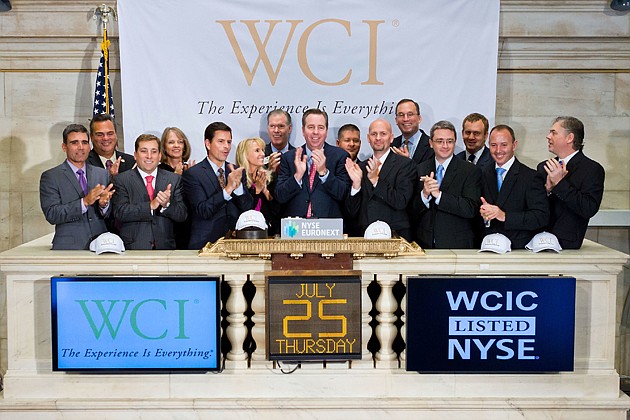- November 25, 2024
-
-
Loading

Loading

When Keith Bass was a rising executive with homebuilder Taylor Woodrow, his biggest competitor was the company he now leads: WCI Communities.
“They were the big gorilla,” says Bass.
Indeed, WCI was the homegrown building and development company built by legendary Florida developer Al Hoffman Jr. In the 1990s, Hoffman engineered the union of his own company, Florida Design Communities, with Westinghouse Communities, taking the combined company public in 2002.
Hoffman left WCI and sold his stake in the company to become U.S. ambassador to Portugal just before the real estate bust in 2005. Following a bitter struggle over the company with investor Carl Icahn, WCI filed for bankruptcy reorganization in 2009.
Now, as CEO of WCI, Bass is there to guide the company back to its position of strength as a premier developer and homebuilder. In one of the most surprising turnarounds of the year, WCI returned to the public markets in 2013, raising $91 million in an initial public offering of stock (symbol: WCIC) and selling $200 million of bonds.
In bankruptcy reorganization, the company's creditors bet that the WCI was worth more as a single entity than sold off for pennies on the dollar. “The bones of the organization were so strong, the combination was more valuable than the pieces,” Bass says.
Through reorganization, the company wrote down all the assets to their ultra-low values in 2009. Such “fresh start accounting,” as it's called in the industry, gave WCI new life as it eventually started selling homes again. Still, it was a bold move considering the real estate market had collapsed in 2009 with no clear outlook for the future.
But slowly, the real estate market recovered as it always does in Florida, and investors took note. “The large institutional investors have a lot of faith in the housing market,” says Bass. Florida ranked third in the nation in population growth and second in homebuilding permits in 2012, he notes.
Land play
With $200 million in cash on its balance sheet and access to another $75 million in credit, WCI has a shopping list for land. That's despite the fact that it already controls about 8,600 home sites.
Land acts as an anchor in the downturns as developers and homebuilders struggle to carry it. But in the recovery, homebuilders need a full pipeline so they can continue building into the future. WCI has the advantage that its land was written down to 2009 values in bankruptcy, so the profit margins it earns today are greater than competitors who are buying land at higher prices now.
Many of the lots that WCI controls are in existing developments the company started years ago. WCI now has 10 communities in which it is selling homes, from Tampa to Naples and across the state.
Bass says WCI is shopping for land, but he says the company is careful about prices and finding the right locations. “There's not that many spots left,” he says. Close to the coast, WCI will have to build smaller projects than it has in the past when big tracts of land were still available.
Residential land in Florida has doubled and tripled in price recently as builders scramble for the best locations. “If we can't find it, we won't spend it,” Bass says. “It's very specific to a locations and competitors' need.”
Still, Bass says residential land prices have stabilized recently. “Prices have stopped the escalation,” he says. “The market's cooled off a little bit.”
Bass isn't worried about overbuilding. Homebuilders such as WCI still have considerable opportunities because the number of permits builders are pulling in Florida over the last year have trailed 2005's peak by 70%.
Demand returns
WCI needs land to keep up with demand that is rising at a fast clip. WCI's homebuilding sales for the quarter ending Sept. 30 rose 81% to $60.8 million compared with the same quarter in 2012.
The company focuses on developing master-planned communities with luxury amenities such as clubhouses, pools, golf and tennis. It targets move-up, second-home and older buyers. As a result, WCI is less vulnerable to increases in interest rates because about half of its buyers pay cash for homes that sell for an average of $429,000.
“The fact that our buyers can get 4.5% [mortgage] money but choose to pay cash says a lot about them,” Bass says. Once they commit to buying a home, only 4% back out, the company reported.
In its previous life, WCI tried to diversify its business and expanded to other parts of the country. Bass says the new WCI is sticking to the Sunshine State, saying investors like the single-state focus of the company. “They like the fact that we're Florida only,” he says. “They felt like the market had been beaten down and the long-term prospects for Florida were so strong.”
Indeed, WCI's backlog continues to look promising. New orders in the third quarter jumped 139% from the third quarter of 2012. The traffic at sales centers in the third quarter, traditionally a slow one because of weather at that time of year, was up 76% over the same quarter last year.
One area where WCI remains cautious is in the construction and sale of condominium towers. In the boom, WCI was a leading player in the development of condos throughout the state. “This company got tied up in the frenzy,” Bass acknowledges.
Bass is watching a rerun of the condo boom in the Miami area now, where Latin American investors are flooding the market seeking new condos. “It's not a game we're going to play,” says Bass. “We don't want to sell to people who aren't end users.”
Turnaround tips